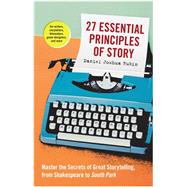“So often people ask me if there’s a book on story I can recommend. This is the one. I can’t recommend it highly enough.”––Alexa Junge, writer/producer, Friends, Sex and the City, The West Wing
A master class of 27 lessons, drawn from 27 diverse narratives, for novelists, storytellers, filmmakers, graphic designers, and more. Author Daniel Joshua Rubin unlocks the secrets of what makes a story work, and then shows how to understand and use these principles in your own writing. The result is “an invaluable resource” (Publishers Weekly, starred review), offering priceless advice like escalate risk, with an example from Pulp Fiction. Write characters to the top of their intelligence, from the Eminem song “Stan.” Earn transformations, from Alison Bechdel’s Fun Home. Attack your theme, from The Brothers Karamazov. Insightful, encouraging, filled with attitude, and, as Booklist puts it, “perfect for any writer looking to ensure their stories operate and resonate at the top of their potential,” this book gives contemporary storytellers of all kinds a lifeline of inspiration and relatable instruction.
“[The] new bible of lessons and practices for creators.”––Library Journal
“Not a ‘how-to,’ thank God, but a ‘here’s why.’ Writers of all levels of experience will benefit from reading––and then rereading––this elegant exploration of the principles of storytelling.”––Traci Letts, Pulitzer and Tony Award-winning playwright
“A godsend for storytellers in all media. It will help you decide what to write and then show you, step by step, how to tackle virtually any problem you face.”––Anna D. Shapiro, Tony Award-winning director, August: Osage County








